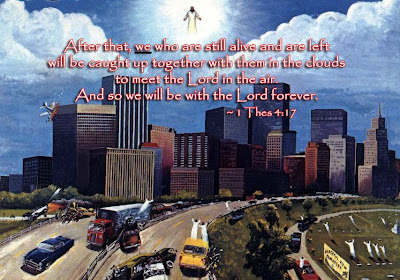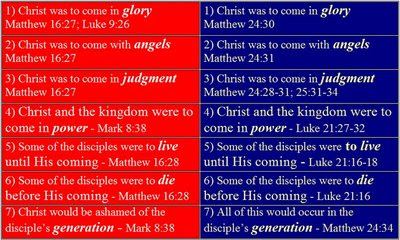I watched the Energy Non-Crisis video (below) and it was no less disheartening the second time around. Lindsey Williams (the speaker), a man who spent his working life in the oil business, is definitely not the bearer of good news. The economic outlook is extremely pessimistic due in large part to the oil squeeze. The financial markets are highly unstable. The DOW takes 1 step forward and 5 back. Our gross national debt has risen from $1,000,000,000,000 in 1981 to currently more than $9,500,000,000,000 (debt counter), while the dollar is falling rapidly against most major currencies. How are we, who have an everlasting hope, to respond to the constant negativity around us?
Is this a new phenomenon? Are these times signaling a new era of doom? Are we marching ever closer to what many perceive as the end? Is the combination of a potential economic meltdown, along with our ever-increasing slide into morally bankruptcy, flagging the demise of planet earth? Is the message of the Gospel too weak to overcome the cesspool of sin that is bearing down on the Church? Most answer these questions with an emphatic “Yes”, due in part to what I believe is confusion concerning the Apostle Paul’s intended target audience in his second letter to Timothy.
Few would argue that Paul is writing directly to Timothy (not 21st century believers) but yet many seem to disregard the near-term first century applicability of Paul’s prophetic words. Even though people concede the letter was written to Timothy, in their view the brunt of the expected fulfillment was still thousands of years future. Therefore the term “last days” loses context when we insert it anywhere we think the sinful attitudes spoken of by Paul fit the times–as if there’s ever been a generation since time began where sinful passions were the exception. How can it be that the “last days” is considered to span a longer period (2,000 years) than the entire Mosaic economy (1,600 years)? Does this make sense to you? It didn’t to me but for most of my Christian life I went with it because I had no better interpretation.
How do we attempt to deal with this issue regarding prophetic fulfillment of the NT? Many admit that Paul was speaking directly to Timothy but I believe we wrongly assume that there’s some sort of an expected “double-fulfillment” (partially fulfilled “then” but really fulfilled in the distant future). What precedent do we use to treat NT prophecy in this manner? I can’t find any because it seems as though it’s controlled solely by presupposition.
This 2X (double fulfillment) interpretational approach is not based upon sound hermeneutics (science of interpretation) but more on a willingness to make the Bible fit the expectations of our beliefs. You may say, “Wait just a minute! How can you make such an emphatic statement?” Old Testament texts foreshadowed that which was to come in the person and work of Christ. On the other hand, the New Testament was given to reveal the mysteries of the OT. That which was clandestine and shadowy, was fulfilled by Christ and His Kingdom. Old Covenant types were fulfilled in the anti-types of the New Covenant. The NT is not foreshadowing anything future since Jesus Christ was (is) the fulfillment. (Col 1:26-27; Col 2:2; Rom 16:25; 1Cor 2:5-8; Eph 6:19; Heb 8:5; Heb 10:1; 2Cor3)
The Old Testament is the New Testament concealed. The New Testament is the Old Testament revealed. This, in my opinion, is an extremely crucial concept to comprehend and friend, Brian Martin’s Behind the Veil of Moses, brings clarity to this issue.
As an aside, if you aren’t familiar with my writing, you may not know of my unwavering commitment to the inspiration and inerrancy of Scripture and its relevance for daily living. Where else are we to turn for the words of truth? However, it’s vitally important to note, although the Bible was written for our benefit, It was not written directly to us. This must be taken into consideration, especially when reading prophetic texts like the one to follow. If we don’t concern ourselves with the intent of the author and the relevance to the direct recipients, we do ourselves a grave disservice. So please consider the time period of the writings. Paul’s second epistle to Timothy was written in the mid to late 60’s AD and both Peter and the writer of Hebrews made it clear they were living in the “last days“. (Acts 2:16-21; Heb 1:1-2)
- But understand this, that in the last days there will come times of difficulty. 2 For men will be lovers of self, lovers of money, boastful, arrogant, revilers, disobedient to parents, ungrateful, unholy… 13 But evil men and impostors will proceed from bad to worse, deceiving and being deceived. 2Tim 3:1-2, 13
Ripped from it’s first century context, this passage seems to mirror that which is taking place in twenty first century America. Was Paul speaking to us or to them (early Church)? What you believe about the time-frame of the “last days” will dictate whether you believe there’s a solution for today’s moral woes. If we presume Paul was speaking directly to Timothy (I believe he was) about things that are about to befall their generation (at the end of the Jewish age), then the 2008 church is not chained to a “bad to worse” expectation. Do you see the point? Do you understand why this is such a crucial issue. What you believe concerning the timing of the “last days” is of vital importance.
The majority of pastors today place 2Timothy 3 within present day confines. They ignore audience relevance (the Word was relevant to the audience at hand) and the historical context. If we don’t choose to develop sound conclusions based upon careful study, the matter will be decided for us. Matter of fact it already has been hoist upon us unless and until we take action. The wheels of doom and gloom are already in motion and we will continue to pay dearly for it. And sadly, it’s considered heretical to even question the sacrosanct things we’re talking about. How dare anyone suggest that the “last days” was a first generation time period culminating in the abolition of the Jewish age (Old covenant temple sacrifices and adherence to the entire body of 613 laws etc). But it’s never too late to reverse the train of expected defeat, toward a Gospel of hope, reconciliation and redemption. It will take tremendous effort but it can and ultimately will be done. I just hope it’s our generation that changes the course.
Videos like the one below speak of our near-term annihilation and the rapture’s escape route. (As if God has ever employed this “get out of life free” card–see the lives of the apostles and prophets) Ask yourself if these ideas accurately reflect the Scripture or are they merely a worn out “Groundhog’s Day” refrain? Are we so naive to believe that we live in perilous times never to be repeated. The Black Plague pandemic of the 14th century took the lives of 75,000,000! It’s estimated that the Plague reduced the European population between 25-60%. They undoubtedly thought the end had come upon them and in many ways it did.
For a sobering perspective of the lives lost in wars and related oppression, click this LINK. You will be disgusted but it will provide a much needed frame of reference. Estimated deaths due to armed conflicts since the 8th century equaled 350,000,000. The non-combatant fatalities due to severe oppression were approx. 288,000,000. Genocidal mortality was approx. 59,000,000. Lastly, the death toll for man-made famines and human sacrifices were 61,000,000. Combined there were more than three quarters of a billion deaths! And we have the audacity to bring Jesus’ reference to “wars and rumors of wars” into modern focus. I don’t mean to be harsh, but it seems to me that we have an incredibly limited scope of understanding. Until I began to study I certainly did.
We’ve become so myopic that we can hardly see the forest’s Kingdom through the trees of despair. I’m not implying that most of us are suicidal but I do think there’s an underlying anticipation of moral decay that we’ve come to expect. Why? Because we believe we’re living in the last days. We cannot escape our eschatological conclusions. However, God’s sovereign plan of victory will not be thwarted by uncooperative believers. His purposes will prevail. We serve a mighty King and we will not be defeated because we are citizens of His Kingdom and God will not fail. For the Kingdom is not of flesh and blood but by the power of God!
Just as Christ said, “The poor will always be with you“, it appears that this “Left Behind” message (which only rose to prominence in the mid 1800s) espoused in the below video, will also forever be with us until it’s countered by diligent Bible study and sound teaching. What difference does eschatology make? Why do I stay the course on this issue?
One look at the below video should answer those questions. I believe this eschatology of hopelessness has sold us into the slavery of pessimism, unwittingly denying the essence and hope of the Gospel. Since times are worsening (they always are in someone’s view) and we only have a short time left (or so we are constantly told), what’s the use in being faithful ambassadors? How can we be effective salt spreaders and light givers if it will all be for naught. Is our job to make disciples or merely throw a few fish into the boat before the elements melt with fervent heat? Are we not supposed to make a difference in all areas of life? Should the Gospel of the Kingdom not pervade all things including the environment? Stewardship has to do with caring for that which God has graciously given to us. (This 3 minute video may take 20-30 secs to load)
When I first entered the financial services industry in 1980, interest rates were skyrocketing, topping out at more than 20% in ‘81, the economy was in a tail spin and national confidence was extremely low. The Middle East situation was tenuous at best and the anticipatory return of Christ was reaching feverish levels.
Gary North and crew, along with gold guru Howard Ruff and all the gloom and doomers, were predicting gold prices of $3,000/oz from the less than $300 it stood at the time. (Incidentally, Ruff’s now back at it again after a 23 year hiatus—I presume his long disappearance from public view was due to his plethora of failed predictions) Due to the “massive debt” (not by today’s standards!) and by inflation run amuck, gold did soar to nearly $800/oz. But by the end of ’81 gold had retreated to $275. Today, economically things seem bleaker than ever with gold up to $976/oz today and gas prices affecting almost everything. Yet, we worship a sovereign God who’s working all thing according to the counsel of His will. His unseen Kingdom, that can only be tapped by faith, has initiated billions since Christ walked the earth. And it’s not about to stop now no matter the economic conditions we face.

However, in spite of being cognizant of God’s management of this world, it should be noted that His sovereign plan has never been void of human suffering. We oft pay the consequences for not only our sins but also the wayward acts of others including our elected leaders. Just consider the past 150 years of U.S. history. We’ve endured civil wars, world wars and economic hardship beyond anything this generation has experienced or can even imagine. Everything negative is always “a sign of the times“. We’re always “nearing the end“. When will we wake up? Jesus’ prophetic Olivet Discourse (Mt 24; Lk 21; Mk 13) pertained to the “this generation” of the first century. Not us!
- “Then they will deliver you up to tribulation and put you to death, and you will be hated by all nations for my name’s sake.” Matthew 24:9 (ESV)
Is this prophetic Word still future? When I consider the fact that John the Baptizer and 10 out of the 12 apostles were ruthlessly murdered (in accordance with the prophecy), it’s quite obvious that neither the first century Christ followers nor today’s Christians two millennia removed, were/are shielded from the pain and suffering that result from living in a fallen world. Matter of fact, trying to wrap the idea that it was God’s plan for Peter to glorify His Father in the manner of his death, is almost unfathomable for the westernized twenty first century Christian. But aren’t health, wealth and prosperity the marks of a believer? Not my idea of the John 10:10 abundant life preached by the likes of Osteen and Schuler. (Their attitudes are infectiously positive—if they only saturated their positive mindset with the truth of the Gospel…How can you be saved from your depravity if you are unaware of your sin problem?…but that’s for another time)
Is earth supposed to one day be void of human suffering? Is this truly Biblical? One need look no further than the last chapter of the Bible for the answer. This is a picture of our world today. Inside the unseen New Jerusalem that is from above, there is peace, security, redemption and relationship with Jesus. Outside are those that do not yet know Jesus as savior. God has enrolled us in the task of inviting the lost sheep to King’s dining table. How blessed are we that are entrusted with such a sobering mission.
- “Blessed are those who wash their robes [believers], so that they may have the right to the tree of life and that they may enter the city by the gates. 15 Outside are the dogs and sorcerers and the sexually immoral and murderers and idolaters, and everyone who loves and practices falsehood. 16 “I, Jesus, have sent my angel to testify to you about these things for the churches. I am the root and the descendant of David, the bright morning star.” 17 The Spirit and the Bride say, “Come.” And let the one who hears say, “Come.” And let the one who is thirsty come; let the one who desires take the water of life without price. Revelation 22:14-17 (ESV)
What a marvelous invitation for those who do not know Christ. Come, all who are thirsty to drink of the eternal water of life. For Jesus said:
- Jesus said to her, “I am the resurrection and the life. Whoever believes in me, though he die, yet shall he live, 26 and everyone who lives and believes in me shall never die. Do you believe this?” John 11:25-26 (ESV)
The comfort and solace I draw is in knowing that whatever God’s plan is, there is one. And I can say with confidence that the message of the Gospel is not one of defeat. Those that taste life shall never die! If this were not so, Christianity would not have survived the first century. People will not give their lives for something unless they are convinced it’s truth.
Faith to me is trusting God in spite of the sometimes menacingly uncertain outlook, confident that His redemptive plan will not be thwarted. Our massive national debt, $8/gal gas or a Middle East chaos brought on in part by the Christian Zionists will not disrupt God’s redemptive plan. These are not the signs of the end. How can I be so certain? Because we have the historical record that many Christians are unaware. There’s proof that every Jesus predicted, everything, happened in the exact time frame predicted. (I challenge you to listen to the 10 sermons by Pastor David Curtis. Go to www.charlescoty.com/audio2.html and scroll down to Olivet Discourse 2007. Each sermon is complete with a transcript. You will not be disappointed. Challenged, yes, disappointed, no)
As the tribulation began in the spring of AD 66, it didn’t look too promising for the home team. The new spiritual Kingdom, which began as a mere trickle of water through the ministry of the incarnate Christ and a handful of young, often confused recruits, was continually losing its most devout leaders to prison and/or death. How did Christianity survive the first century? How could this subversive movement thrive when their leadership was continually eliminated? Were those days, when the Gospel was spreading like wildfire, less taxing that what we face today? We get exercised over dropped mobile phones call when the first century faithful were joyfully accepting the plundering of their goods for the sake of the Gospel. (Heb 10:33-34)
Why was the early church so successful? God’s sovereign plan is the short answer. But more specifically, I think it was the hope of the Gospel that not only secured their heavenly future, but also gave them a clear vision through their call as ambassadors—to effect change within the context of their earthly responsibilities. They were not so heavenly minded that they were of no earthly good. Actually quite to the contrary. They were so heavenly minded they were of immense earthly value. I think herein lies the difference between first century and twenty first century believers. They forsook life and limb for the propagation of the Gospel. For the Apostle Paul, living or dying was a win-win proposition.
- Philippians 1:21-26 (ESV) “For to me to live is Christ, and to die is gain. 22 If I am to live in the flesh, that means fruitful labor for me. Yet which I shall choose I cannot tell. 23 I am hard pressed between the two. My desire is to depart and be with Christ, for that is far better. 24 But to remain in the flesh is more necessary on your account. 25 Convinced of this, I know that I will remain and continue with you all, for your progress and joy in the faith, 26 so that in me you may have ample cause to glory in Christ Jesus, because of my coming to you again.”
It absolutely boggles my mind when I hear people say that since the days of Noah we’re living in history’s worst times. Making this kind of statement seems to uncover a poor comprehension of the historical record or a need to conform Scriptural interpretation to our paradigm. Weren’t all believers who lived in the transition period (AD 30—AD 70) in danger of losing their lives? Being baptized came at great cost. Identifying with the “way” at best came at a cost of social alienation and worse was a death sentence. Is this the prevailing condition of the 21st century?
Consider how far the Kingdom has come! How wonderful is the matchless grace of Jesus! From a mere trickle of water emanating from Temple to rivers of water too deep to traverse—the Gospel has had a massive worldwide impact.
Ezekiel 47 sums it all up. Instead of this “woe is me” attitude of defeat and the short term mentality created by an ill-fated eschatology, we need to rise above the negative chatter and proclaim the victory of our Savior through the Gospel. Yes, things may appear hopelessly headed down the path toward a cataclysmic end. But if we take a step back from our myopic “can’t see the forest from the trees” view, we recognize that nothing could be further from the truth! No one should be pleased with the condition of today’s Church and our pathetic influence on society, (or should I say society’s influence on the Church) but in the panoramic view of history we can easily observe the Gospel’s revolutionary affect on every culture with which it has permeated.
Hopefully in the near term, armed with a victorious Gospel proven by an eschatology of spiritual conquest, we will begin to make inroads into the psyche of the Church. Pessimillennialism strikes at the heart of our goal to bring the waters of the Spirit to every nook and cranny of planet earth.
Time and again, either through conversations or reading the musings of bloggers, I see passages from Titus and 2Timothy (referenced earlier) offered as proof that we are living in the hopelessness of the last days. As I have noted in prior articles, It Depends What the Meaning of ‘Is’ Is; Hermeneutical Principles—Reading the Bible with First Century Glasses; Audience Relevance in the Olivet, this kind of interpretation ignores such hermeneutical principles as audience relevance, the analogy of faith (interpreting Scripture in light of Scripture) and a Biblical understanding of time. I believe the anemic Gospel (where the earthly Church loses to satan) espoused by many, should be boldly countered with Scripture and replaced with the hope of a Church sold out and submitted to the Lordship of Christ and the power of the Gospel. According to the Apostle John we truly are overcomers. Many of us just don’t know it yet. Just think what could be if we actually believed what we read in Scripture…
- 1 John 4:4 (ESV) Little children, you are from God and have overcome them, for he who is in you is greater than he who is in the world.
- Hebrews 2:14-15 (ESV) Since therefore the children share in flesh and blood, he himself likewise partook of the same things, that through death he might destroy the one who has the power of death, that is, the devil, 15 and deliver all those who through fear of death were subject to lifelong slavery.
- Colossians 2:13-15 (ESV) And you, who were dead in your trespasses and the uncircumcision of your flesh, God made alive together with him, having forgiven us all our trespasses, 14 by canceling the record of debt that stood against us with its legal demands. This he set aside, nailing it to the cross. 15 He disarmed the rulers and authorities and put them to open shame, by triumphing over them in him.
I’m writing this as much as a wake-up call to myself than for the rest of you. It’s easy to become entangled in pessimism when a fill-up is more than $60 and job security is so fragile. It’s more evident to me than ever that I have to continually renew my mind with truth, being cognizant of the vital hope in our New Covenant promises?
As gas prices continue to float skyward and as the ensuing economic misery sets in, may we not lose heart, knowing that our God does indeed reign. We must lead the way. We’ve got to be the forward-thinkers. We must be the glass-half-full Christians because the Gospel should produce nothing less. I believe we must become positive difference-makers like self-help guru Joel Osteen, but instead of preaching self actualization and a vacant syrupy Gospel, we, armed with the sword of the Spirit, should boldly proclaim the power of the cross and an eschatology of victory. Let me leave this with you from the prophet Ezekiel. Read the whole chapter if you have a chance. This is a picture of God’s growing unseen Kingdom.
- Ezekiel 47:5-9 (ESV) “Again he measured a thousand, and it was a river that I could not pass through, for the water had risen. It was deep enough to swim in, a river that could not be passed through. 6 And he said to me, “Son of man, have you seen this?” Then he led me back to the bank of the river. 7 As I went back, I saw on the bank of the river very many trees on the one side and on the other. 8 And he said to me, “This water flows toward the eastern region and goes down into the Arabah, and enters the sea; when the water flows into the sea, the water will become fresh. 9 And wherever the river goes, every living creature that swarms will live, and there will be very many fish. For this water goes there, that the waters of the sea may become fresh; so everything will live where the river goes.”










